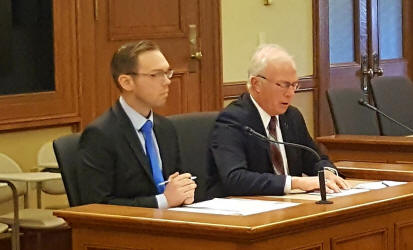|
|
|
|
|
SB 100 Regulatory Reform: Scope Statement
Expiration |
| |
|
|
|
Testimony of Senator Steve Nass |
| |
Senate Committee on
Government Operations, Technology & Consumer Protection |
|
|
March 30, 2017 • 411 South, State Capitol |
|
|
|
|
|
Thank you Chairman Stroebel for holding a public hearing
and allowing me to provide testimony in support of
Senate Bill 100. This legislation is one step in a
number of actions we plan to take this session to reform
the regulatory climate in the state of Wisconsin. SB 100
will limit the duration of a scope statement authorizing
promulgation of an administrative rule to no more than
30 months. |
|
|
|
|
|
As co-chairman of the Joint Committee for Review of
Administrative Rules (JCRAR), one of my priorities has
been to scrutinize new rules to ensure that they are
authorized by statute and absolutely necessary to
protect the public, so we can reduce the regulatory
burden on Wisconsin’s citizens and businesses. One of
the top concerns cited by many business owners around
our state and nationally is the cost and burden of
overregulation. In many cases they cite onerous
regulations as an even larger problem than tax levels. |
|
|
|
|
|
Under current law, a state agency must submit a
statement of scope to the Governor for approval in order
to begin promulgating an administrative rule. The scope
statement must outline the objective of the rule,
provide a policy analysis of the rule, and demonstrate
that the agency has the statutory authority to
promulgate the rule. The Governor can either approve the
scope statement, allowing the rule process to move
forward, or reject it, in which case the agency cannot
continue with the new rule. |
|
|
|
|
|
After the Governor approves a scope statement, it is
submitted to the Legislative Reference Bureau (LRB) for
publication in the Wisconsin Administrative Register.
Once a scope statement is approved under current law, it
never expires. The agency can move forward on it at any
time in the future, even if it is many years later. |
|
|
|
|
|
This bill provides for the expiration of a scope
statement after 30 months (2.5 years). If an agency
wants to move forward with promulgating an
administrative rule based on an expired scope statement,
the agency would have to resubmit the scope statement
for approval by the Governor. Under the bill, all new
scope statements will expire 30 months after publication
in the Wisconsin Administrative Register. All currently
approved scope statements will expire 30 months after
the bill is signed into law. |
|
|
|
|
|
Our goal is to have agencies move forward on necessary
rules in a timely manner based on current realities, but
not indefinitely maintain rulemaking authority many
years after the fact, when the underlying conditions
that once granted the authority may have significantly
changed. |
|
|
|
|
|
As the JCRAR co-chairman, I have seen a number of
examples of state agencies advancing rules on the basis
of a scope statement that was approved many, many years
ago, by different Legislatures and even a different
Governor. In one example, a rule was held so long by the
agency that the underlying statute creating the rule had
already sunset. In another case, we received a rule in
which the scope statement was filed almost 10 years
before submittal to the Legislature. |
|
|
|
|
|
This bill will ensure that all new administrative rules
have up-to-date approval from elected officials, are
based on current and accurate information, and are acted
on in a timely manner. Expiration dates on scope
statements will lead to a more transparent and effective
rulemaking process by allowing for increased public
involvement and greater oversight by elected members of
the Legislative and Executive branches. |
|
|
|
|
|
 |
|
|
|
|
|
Senator Nass Offering Testimony in
Support of Senate Bill 100 |
|
|
|






